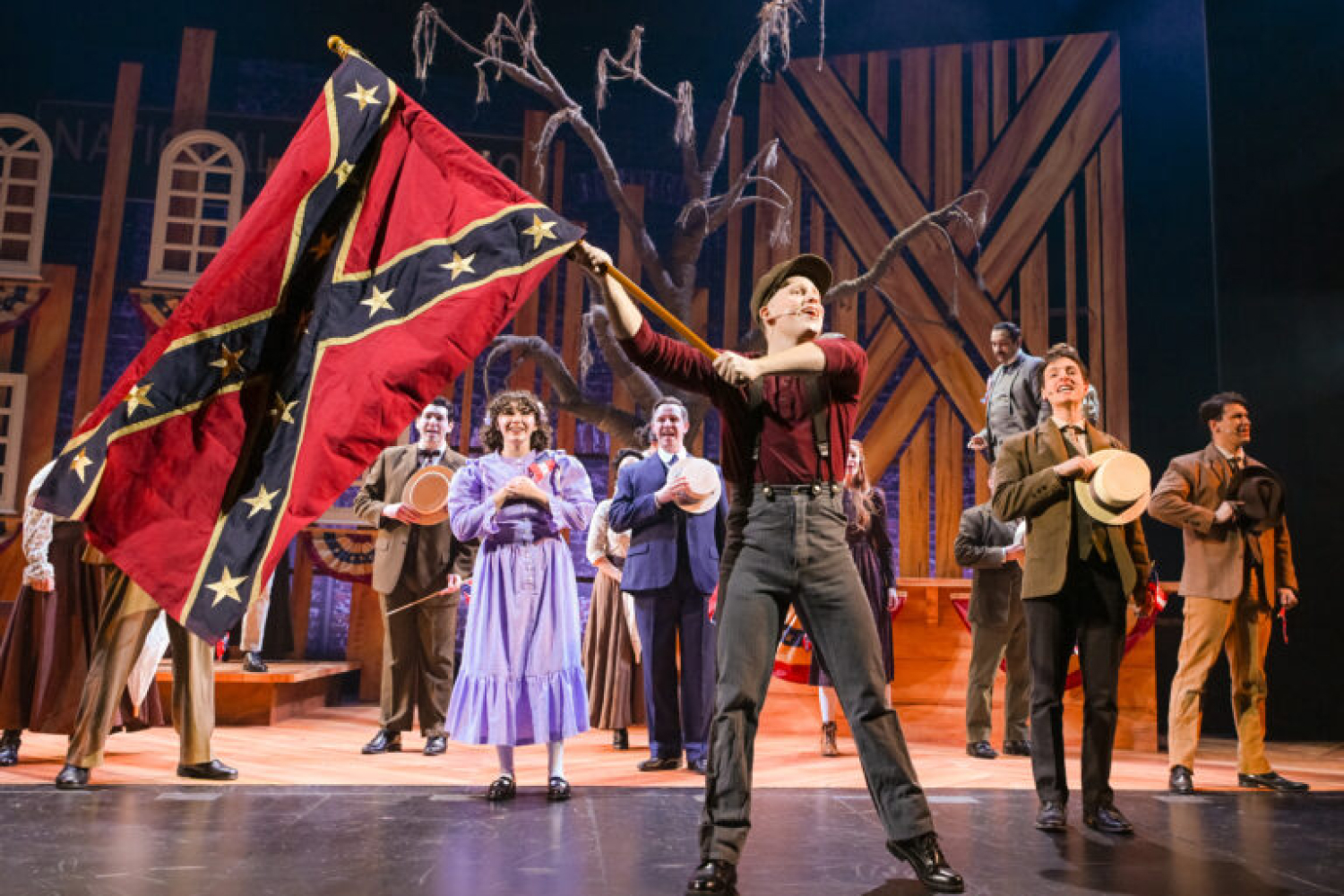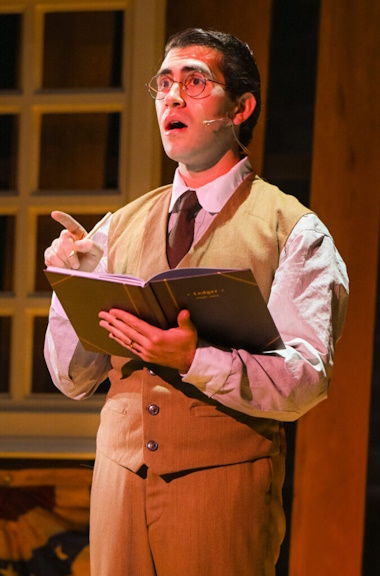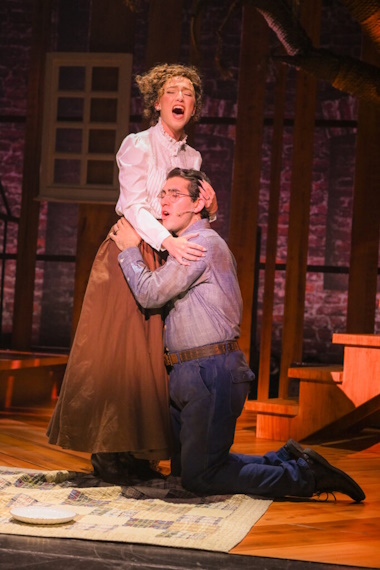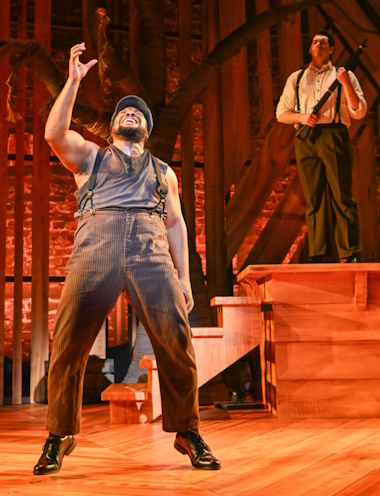
Characters in Slow Burn Theatre's "Parade" demonstrate their Southern pride. (Photo by Larry Marano)
Thoughts may race through your mind as you experience the Tony Award-winning 1998 musical "Parade." Perhaps the whispers are incessant in your head throughout the show's roughly two-and-a-half hours. Or, maybe they are intermittent during those thrilling, at times shocking 150 minutes, which include a 15-minute intermission.
Those murmurs may materialize in your mind as follows: "It cannot happen today. Lynching is a crime from another century, another time. We may live during a period of hate, division, fear, and ignorance, but such shocking deeds as lynching...not in 2025. Please, God, no."
But "Parade," and Slow Burn Theatre Company's excellent current professional production, are here to tell you otherwise. Yes, such crimes can happen today - believe it.
As if to emphasize that, the set design for Slow Burn's production, which runs through Sunday, Feb. 23, basically remains unchanged throughout. Specifically, Nikolas Serrano's design includes a tree and a wooden platform with steps. You may conclude that Serrano is trying to depict an execution or lynching site. Throughout the show, other scenic pieces, such as props representing someone's house, enter and exit the stage. But the tree and platform remain like a constant reminder. They remind us that history can, indeed, repeat itself. And "those who do not learn history are doomed to repeat it," the saying goes.

Justin Albinder as Leo Frank.(Photo by Larry Marano)
A national touring production of the Tony Award-winning 2023 Broadway revival of "Parade" is playing in cities across the country. Unfortunately, so far, the producers have not included South Florida in their plans. And perhaps you were unwilling to mortgage your future for ridiculously expensive tickets on Broadway. How fortunate we are, then, that Slow Burn Theatre Company Artistic Director Patrick Fitzwater has included "Parade" in Slow Burn's 2024-25 season line-up.
In the show, we vividly experience historical events that may be absent from history textbooks. Certainly, the timing could not be more appropriate for "Parade." We have seen from recent events that the current climate is ripe and has wrought hate-fueled violence. With that in mind, hearing lyrics such as the following can chill your bones: "Hanging another N-- ain't enough this time. We gotta do better."
The singer of those lyrics is Hugh Dorsey (Kevin Patrick Martin) Atlanta, Ga.'s district attorney during the time that the show depicts. (A vibrant live orchestra accompanies the performers in song).
Dorsey served as prosecutor during the real-life trial of Leo Frank. He was a Jewish pencil factory superintendent in Atlanta. Authorities accused him of killing 13-year-old employee Mary Phagan in April of 1913. Over the decades, historians and others have generally agreed that Frank's Jewish identity was one of the primary reasons that authorities arrested, charged, and convicted Frank. But the lack of evidence linking Frank to the crime all but exonerated him.
In the pencil factory, Phagan (an innocent and playful Jessica Balton) operated the machine that inserted rubber erasers into the pencils' metal cylinders. If only we could erase painful historical moments from our past, you may be thinking.
A large cast of triple-threat performers brings their historical characters to believable life. Under Fitzwater's skilled and sensitive direction and choreography, the actors inject their convincing and moving portrayals with nuance, variety, energy, and spontaneity. You may recognize some of the cast members as regulars on South Florida stages. Other performers may be new to you.

Mikayla Cohen as Lucille Frank and Justin Albinder as Leo Frank. (Photos by Larry Marano)
Justin Albinder delivers an impressive performance as Frank. With brown eyes behind glasses, under a head of dark hair, a clean-shaven Albinder looks and acts like a studious, tense, but pure and passionate individual. As Albinder portrays him, this young man does not appear to contain an iota of wickedness. The only exception comes during Frank's trial. It includes flashbacks and fantasy sequences. For instance, at one point, the prosecution tries to paint Frank as a lecherous individual who wooed young female employees to his office. As witnesses for the prosecution falsely portray Frank as a philanderer, Albinder and other performers act out the scene. And Albinder, during the song titled "The Factory Girls/Come Up To My Office" suggests an irreputable man itching for some extracurricular activity.
Generally, Albinder imbues Frank with a driven, tense demeanor. Also, clearly, this young man without a southern accent seems out of place among the southerners populating Atlanta at the time. Through songs such as "How Can I Call This Home?" which Albinder performs clearly and sincerely, it becomes clear how awkward Frank feels. Frankly, you wonder what this Jewish New Yorker is doing in the South at that time. Sure, he is devoted to his wife and his work. But what brought him from Brooklyn, N.Y. to Atlanta in the first place, you may wonder.
At times, Frank even seems out of place with his wife. A terrific Mikayla Cohen portrays this Southern Jew. She is torn between maintaining her southern roots and appeasing her husband. For example, obvious tension exists between the couple after Lucille suggests sharing a picnic with Frank. The occasion? Confederate Memorial Day. We also sense that Lucille feels her husband values his work more than her. While a palpable strain exists between the couple, the tension gradually melts. A warm, loving relationship slowly becomes obvious. In fact, it appears they are truly happy after the governor (a refined Michael Materdomini) decides to reexamine Frank's case following his guilty conviction.
Cohen, who is no stranger to Slow Burn, is a young, expressive performer. She excels at conveying a character's feelings and emotions sincerely and intensely, without forcing anything. In "Parade," Cohen deftly lends Lucille a winning charm. It endears us to her. Also, Cohen injects Lucille with a credible devotion toward her husband. And we note her frustration and conviction. That is particularly true when the character sings heated songs such as "You Don't Know This Man." Through song, Lucille explains that her husband is a good person. His heart in the right place.
Ultimately, we remember Cohen's Lucille as a strong woman. It is hard to break her spirit. Indeed, even after the tragic ending, it seems as though Lucille is at peace; she knows her husband is with her in spirit and that he is in a better place.
Other cast standouts include Materdomini. He plays the governor as a refined southern gentleman harboring ambition, but also a man with a conscience. It appears that something about the trial and Frank's conviction is bothering the governor, and he intends to do something about it. Materdomini also lends the governor a fun-loving demeanor. This is particularly true during songs such as "Pretty Music." The song comes during an upbeat moment in the show. It is one of several instances that starkly contrasts solemn scenes from playful, celebratory, upbeat sequences.
Upbeat is hardly an adjective you would use to describe prosecutor Hugh Dorsey. And Kevin Patrick Martin portrays this district attorney as an ambitious lawyer with a strong purpose. Just listen as Martin's Dorsey whispers the word "Guilty" in a tone that suggests contempt and bitterness. But Dorsey, as Martin plays him, never comes across as a villain.
Michael Hunsaker ably portrays Britt Craig. He is a washed-up, drunken journalist who views the Frank case as a story that may give him his big break. Hunsaker is credibly unsteady and something of a weasel as Craig.
Erik Schark plays Judge Roan with a business-like manner, and if bigotry and racism motivate him, we do not sense this from Schark's portrayal.

Chaz Rose as Jim Conley in Slow Burn Theatre's "Parade." (Photo by Larry Marano)
The versatile Chaz Rose also triumphs in his roles. He portrays Newt Lee, the factory's Black night watchman who found Phagan's lifeless body. Also, Rose plays Jim Conley, the factory's janitor who testified against Frank.
As Lee, Rose intensely but convincingly embodies a man who just made a shocking discovery. Obviously, this is also an individual frightened that authorities will suspect him of Phagan's rape and murder. Watching Rose's anxious Lee and listening to him may call to mind Tom Robinson from Harper Lee's "To Kill a Mockingbird."
We may feel less sympathetic toward Jim Conley, a man who wishes that people would refer to him not as the janitor, but "cleaning supervisor." Conely can come across as pompous, and Rose infuses the character with a showy aura. The performer lends his clear, strong, and expressive voice to numbers such as "Blues: Feel The Rain Fall." In the song, Conley is serving his sentence on a chain gang for being an accessory to the murder.
The actors playing leading roles, together with a strong supporting cast, strongly convey the contempt the characters feel toward individuals such as Leo Frank. Listen, for instance, as Ana Marie Calise, as Mrs. Phagan (Mary's mother) says the word "Jew" in a disgusted tone. A strong sense of solidarity exists between these people, especially when they fiercely express their Southern pride.
Fine behind-the-scenes work includes Eric Norbury's mood-enhancing lighting, Rick Pena's period-appropriate costumes, and Dan Donato's strong, clear sound design.
As usual, Slow Burn has delivered a stunningly authentic production with its production of "Parade."
This is a searing, eye-opening show. It not only sensitively covers themes such as deep-rooted prejudice, racism, and anti-Semitism, but also tradition, heritage, and love. The piece is an honest and intense historical musical and cautionary tale that, at times, leaves you feeling hopeful.
"Parade" may not contain music as memorable as songs from, say, "The Sound of Music," "Ragtime," or "Fiddler on the Roof." But "Parade" features diverse musical styles that neatly capture mood and lend the show emotional depth. Composer and lyricist Jason Robert Brown's rich, varied, and haunting score includes styles such as pop-rock, folk, rhythm and blues, gospel, blues, jazz, and Broadway. Also, the score includes a variety of American music, including Southern laments, love ballads, charm songs, and hopeful anthems. Brown's work is sophisticated and innovative.
Alfred Uhry penned "Parade's" libretto. Uhry is a playwright, lyricist, and screenwriter known for his charming and engaging southern characters. Uhry has won a Pulitzer Prize, an Academy Award, and multiple Tony Awards. "Parade" is part of Uhry's "Atlanta Trilogy," which also includes "Driving Miss Daisy" and "The Last Night of Ballyhoo."
IF YOU GO
WHAT: "Parade"
WHEN: Through Sunday, Feb. 23
WHERE: Amaturo Theater at the Broward Center for the Performing Arts, 201 S.W. 5th Ave., Fort Lauderdale
TICKETS: $72.50 to $77.
INFORMATION: (954) 462-0222 or www.slowburntheatre.org
 MAIN MENU
MAIN MENU

